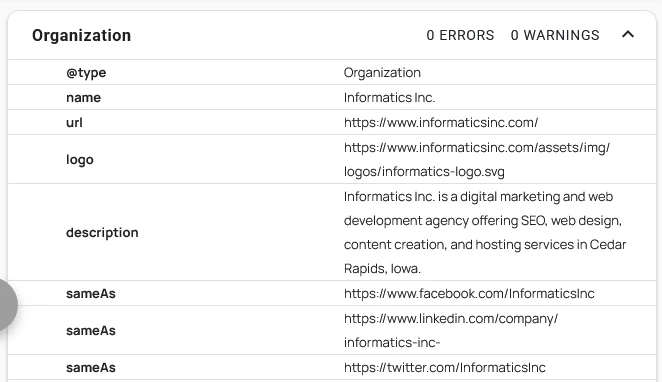
Here at Informatics, the name of our company is also the name of a science. An Internet search for "Informatics in Iowa" might return results for our full-service digital agency, or the top-rated Informatics program at the University of Iowa. So how does that problem get solved?
One way is through schema markup, a labeling process for your website that helps search engines better understand, categorize, and surface your content.
What is Schema Markup and Why is It Important?
Schema markup, often referred to simply as schema, is a specialized form of code embedded within your website's HTML. Introduced back in 2011 and recognized by major search engines like Google, Bing, and Yahoo!, schema markup acts as an invisible labeling system for your website’s content.
Think of it this way: When search engine crawlers analyze your website’s code, they identify what information is present. However, by incorporating schema markup, you provide explicit context, allowing search engines to understand why that information is there and what it means.
This is important for a few different reasons:
- Schema markup enables rich snippets, which are enhanced search results featuring additional information beyond the standard title and meta description. These enriched snippets, including elements like star ratings, images, event dates, and product prices, make your listing stand out from the competition and significantly increase the likelihood of users clicking on your result. Studies have shown substantial increases in CTR for pages utilizing schema markup.
- This enhanced understanding helps search engines and large language models (LLMs) understand the context and purpose of your webpage, and how you might respond to a searcher’s specific intent. That makes it more likely your page will appear in special search result features, AI Overviews, voice search responses, and more.
Here’s an example of schema you’ll find on this website, as shown in a schema validator:

By telling search engines that we are a full-service agency, showing them our social pages, and explaining our various services and contact points, we are clarifying our identity and trustworthiness—Google and ChatGPT don’t have to guess at what we do or who we serve.
All About Schema Markup Types
Schema.org serves as the central hub for schema creators, providing a vast and continuously evolving library of standardized labels. These schemas cover a wide spectrum of content types, enabling you to describe everything from basic information about your brand to granular details about your services, pricing, hours, and more.
The versatility of schema markup lies in its ability to describe a wide variety of content online, including:
- Local Business Schema: Ideal for businesses with physical locations, this markup helps search engines understand critical details such as your business name, address, phone number, operating hours, customer reviews, and location on a map. This is particularly beneficial for appearing in local search results and Google's Local Pack.
- Product Schema: For e-commerce businesses, product schema allows you to highlight key product information directly in search results, including price, availability, customer ratings, and reviews.
- Event Schema: If your business hosts events, this markup can display crucial details like the event name, date, time, location, and ticket availability directly in search engine results pages (SERPs).
- Article/Blog Post Schema: If you’re creating content, schema can help search engines understand the headline, author, and publication date of your articles and blog posts. This can improve visibility in search results and potentially lead to inclusion in SERP features like Top Stories.
- FAQ Schema: Marking up frequently asked questions (FAQs) pages can lead to direct answers being displayed in search results, providing immediate value to users and expanding your SERP real estate.
- Review Schema: This allows you to showcase star ratings and review snippets from your customers directly within your search results, building trust and credibility.
- Service Schema: If you offer services, this markup can detail the types of services you provide, your service areas, and pricing.
By implementing the most relevant schema types for your business, you provide clarity to search engines, ultimately leading to better visibility among your target audience.

Implementing and Testing Your Schema Markup
While schema sounds highly technical, implementing it on your website doesn't have to be overly complex. Here's a general overview of the process:
1. Choosing the Right Schema
The first step is to identify the most relevant schema types for the content on each page of your website. Resources like Schema.org provide a comprehensive list of available schemas. Prioritize the information you want to appear in search results, as it aligns with your overarching digital marketing goals.
2. Generating the Markup
Once you've selected your schema, you need to generate the corresponding code. This used to be done manually, but is often done today through AI generation—just be sure to check all of the schema your AI system outputs, as errors do happen. Other ways to generate schema include CMS plugins such as Yoast, or schema markup generator tools from Google, schema.dev, and more.
3. Implementing the Markup
After generating the schema code, you need to add it to the relevant pages of your website, either through page-level HTML (adding your code to the page header), or via a site-wide platform like Google Tag Manager. GTM is the preferred way to handle schema at scale, but page-level management can work if your site is small.
4. Testing Your Markup
It’s crucial to validate your schema markup to ensure it is implemented correctly and eligible for rich results. Utilize testing tools such as:
- Google's Rich Results Test
- Schema Markup Validator
- Google Search Console
- SEO Audit Tools from SEMrush and others.
Regular monitoring and updates of your schema markup are essential, as search engine guidelines and schema standards evolve over time.
Ready to Enhance Your SEO with Schema Markup?
Despite its significant SEO benefits, only about 30% of websites currently use schema markup. By embracing this powerful tool, your brand can gain a competitive edge in SERPs, making your site more appealing and informative than competitors who do not utilize structured data.
While it may not be a direct ranking signal, its ability to improve how search engines understand and present your content offers substantial SEO benefits in today's increasingly AI-driven search environment.
If you’re ready to add schema markup to your website, or need help building your schema strategy, reach out to us today. Our SEO experts will be happy to review your site and offer up recommendations to keep you competitive in search.
Looking for measurable success online?
Our Digital Marketing experts can help you leverage schema to boost your growth.
